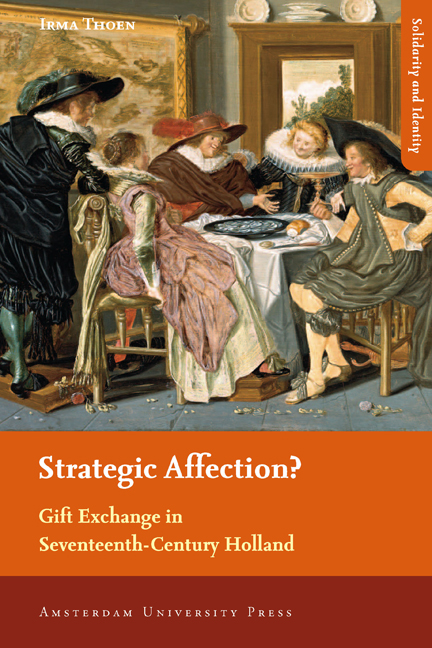Summary
If anything has been clarified over the past few chapters, it has to be the fact that gift exchange is indeed an important social practice. Although human contact is possible without gifts, it is frequently accompanied and enriched by gifts, both in the seventeenth- century and contemporary society. Gifts are exchanged on almost every occasion, sometimes big and splendid gifts are offered, at other times, just a plain cup of coffee. Gifts themselves are instruments: they are used to establish and maintain the social relationships people have. Gifts are employed to initiate social contact and they are used to reaffirm the connection once contact is established.
Still this does not mean that they are solely instruments. Gifts are also signs that have meanings. Gifts are signs of the existence of a relationship, but they can also refer to the ritual status, the social reputation of the recipient, or to the character of the relationship between the donor and the recipient. The signifying quality of the gift is culturally bound. What a gift can mean or cannot mean is governed by cultural conventions. Conventions set the boundaries for the behaviour that is considered appropriate within a gift-exchange relationship, both in terms of practice and the discourse on this practice.
In seventeenth-century Holland, the convention was that gifts were signs of the honour in which the recipient was held, and of the obligatory relationship that the donor and the recipient maintained. They were bound to each other by the expectation of reciprocity. Gifts offered would in time be returned, this was to be expected. Yet when reciprocation would follow and what this would consist of was not made explicit, but was sometimes acknowledged through the discourse of obligation. When offering or receiving a gift, people would in some cases express being obliged to each other, which expression confirmed the relationship that existed between the two parties.
The contemporary discourse on gift exchange in Holland is quite different. The convention prescribes that gifts are offered spontaneously, and when they are offered, the gifts are referred to in terms of affection. Gifts in contemporary Holland are supposed to express the personal feelings that exist between donor and receiver, without referring to a system of exchange.
- Type
- Chapter
- Information
- Strategic Affection?Gift Exchange in Seventeenth-Century Holland, pp. 223 - 230Publisher: Amsterdam University PressPrint publication year: 2006



